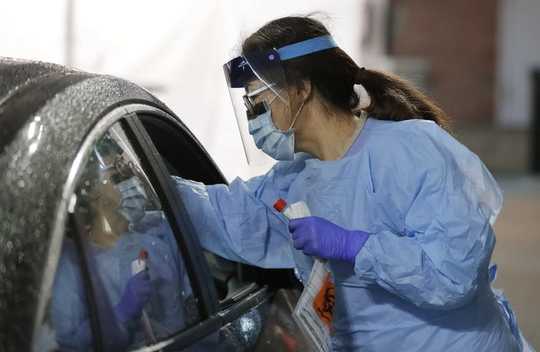 A nurse at a drive-up coronavirus testing station set up by the University of Washington Medical Center on Friday, March 13, 2020. AP Photo/Ted S. Warren
A nurse at a drive-up coronavirus testing station set up by the University of Washington Medical Center on Friday, March 13, 2020. AP Photo/Ted S. Warren
As the nation adjusts to the threat of COVID-19, the illness caused by the coronavirus, it’s only natural to worry whether a cough or aches and pains could be signs you have become infected by the virus. Dr. William Petri, a professor of medicine and immunologist at the University of Virginia Medical Center, explains when you need to call your doctor.
1. What symptoms should I look for?
People should suspect that they might have COVID-19 if they are experiencing fever, cough and/or shortness of breath. These symptoms, however, are also symptoms of other illnesses. For example, the nation is still in the middle of a flu epidemic, and fever and cough are also symptoms of flu. It is most likely that you have flu or other respiratory illness. So, it is important to pay attention to symptoms but to also know they will not necessarily mean that you have COVID-19.
2. When should I see a doctor?
If your have fever, cough and/or shortness of breath, call your doctor. Do not just show up; it is very important to call first. Most doctors’ offices will have ways to isolate someone who potentially has COVID-19. Your doctor’s office will likely ask screening questions on the phone and will provide instructions about what to do when you arrive.
3. I’ve have a runny nose and sniffles. Could this coronavirus?
A runny nose or nasal congestion would not be likely to be COVID-19.
Get The Latest By Email
4. What can I expect at the doctor’s office?
The Centers for Disease Control and Prevention recommends that you put on a face mask before you enter your doctor’s office or other health care facility.
Your doctor or health care provider would likely test for flu first, because the country is in the middle of a flu epidemic. If the flu test is negative then you will be tested for COVID-19, especially if you have risk factors. That would include having traveled to a country or area of the U.S. with sustained person-to-person transmission, or having been in contact with someone with COVID-19.
This likely will change as soon as COVID-19 tests are more available – at that time everyone with a fever and cough will be tested.
About The Author
William Petri, Professor of Medicine, University of Virginia
This article is republished from The Conversation under a Creative Commons license. Read the original article.
books_health










